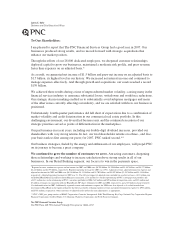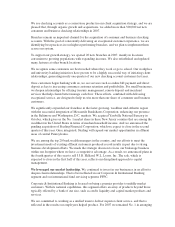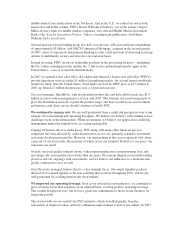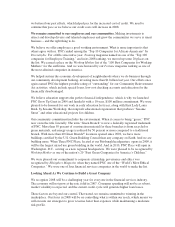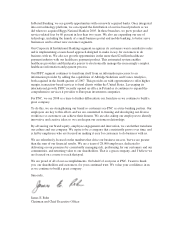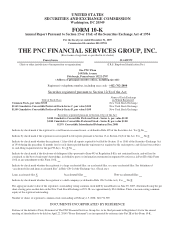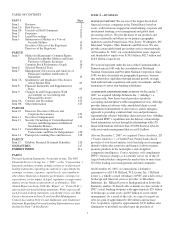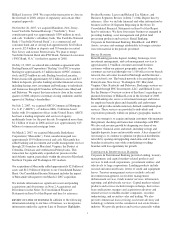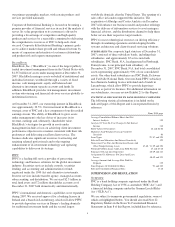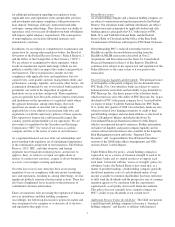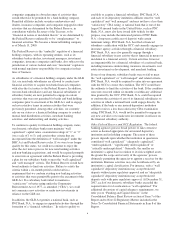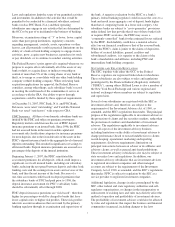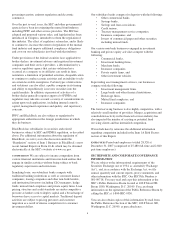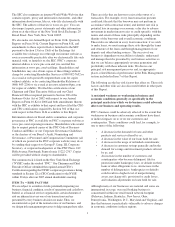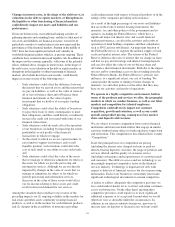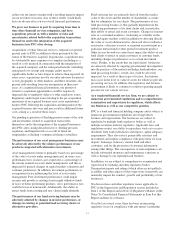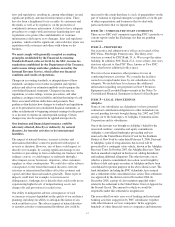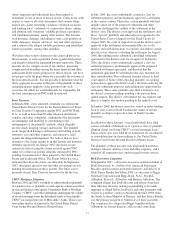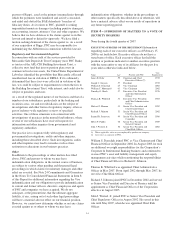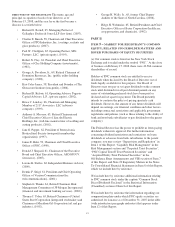PNC Bank 2007 Annual Report Download - page 10
Download and view the complete annual report
Please find page 10 of the 2007 PNC Bank annual report below. You can navigate through the pages in the report by either clicking on the pages listed below, or by using the keyword search tool below to find specific information within the annual report.
for additional information regarding our regulatory issues.
Applicable laws and regulations restrict permissible activities
and investments and require compliance with protections for
loan, deposit, brokerage, fiduciary, mutual fund and other
customers, among other things. They also restrict our ability to
repurchase stock or to receive dividends from bank subsidiaries
and impose capital adequacy requirements. The consequences
of noncompliance can include substantial monetary and
nonmonetary sanctions.
In addition, we are subject to comprehensive examination and
supervision by, among other regulatory bodies, the Board of
Governors of the Federal Reserve System (“Federal Reserve”)
and the Office of the Comptroller of the Currency (“OCC”).
We are subject to examination by these regulators, which
results in examination reports and ratings (which are not
publicly available) that can impact the conduct and growth of
our businesses. These examinations consider not only
compliance with applicable laws and regulations, but also
capital levels, asset quality and risk, management ability and
performance, earnings, liquidity, and various other factors. An
examination downgrade by any of our federal bank regulators
potentially can result in the imposition of significant
limitations on our activities and growth. These regulatory
agencies generally have broad discretion to impose restrictions
and limitations on the operations of a regulated entity where
the agencies determine, among other things, that such
operations are unsafe or unsound, fail to comply with
applicable law or are otherwise inconsistent with laws and
regulations or with the supervisory policies of these agencies.
This supervisory framework could materially impact the
conduct, growth and profitability of our operations. We are
also subject to regulation by the Securities and Exchange
Commission (“SEC”) by virtue of our status as a public
company and due to the nature of some of our businesses.
As a regulated financial services firm, our relationships and
good standing with regulators are of fundamental importance
to the continuation and growth of our businesses. The Federal
Reserve, OCC, SEC, and other domestic and foreign
regulators have broad enforcement powers, and powers to
approve, deny, or refuse to act upon our applications or
notices to conduct new activities, acquire or divest businesses
or assets, or reconfigure existing operations.
Over the last several years, there has been an increasing
regulatory focus on compliance with anti-money laundering
laws and regulations, resulting in, among other things, several
significant publicly announced enforcement actions. There has
also been a heightened focus recently on the protection of
confidential customer information.
There are numerous rules governing the regulation of financial
services institutions and their holding companies.
Accordingly, the following discussion is general in nature and
does not purport to be complete or to describe all of the laws
and regulations that apply to us.
B
ANK
R
EGULATION
As a bank holding company and a financial holding company, we
are subject to supervision and regular inspection by the Federal
Reserve. Our subsidiary banks and their subsidiaries are subject
to supervision and examination by applicable federal and state
banking agencies, principally the OCC with respect to PNC
Bank, N.A. and Yardville National Bank, and the Federal
Reserve Bank of Cleveland and the Office of the State Bank
Commissioner of Delaware with respect to PNC Bank, Delaware.
Notwithstanding PNC’s reduced ownership interest in
BlackRock and the deconsolidation resulting from the
BlackRock/MLIM transaction (described in Note 2
Acquisitions and Divestitures in the Notes To Consolidated
Financial Statements in Item 8 of this Report), BlackRock
continues to be subject to the supervision and regulation of the
Federal Reserve to the same extent as it was prior to the
transaction.
Parent Company Liquidity and Dividends. The principal source
of our liquidity at the parent company level is dividends from
PNC Bank, N.A. Our subsidiary banks are subject to various
federal and state restrictions on their ability to pay dividends to
PNC Bancorp, Inc., the direct parent of the subsidiary banks,
which in turn may affect the ability of PNC Bancorp, Inc. to pay
dividends to PNC at the parent company level. As noted below,
we expect to merge Yardville National Bank into PNC Bank,
N.A., in the first quarter of 2008. Our subsidiary banks are also
subject to federal laws limiting extensions of credit to their
parent holding company and non-bank affiliates as discussed in
Note 22 Regulatory Matters included in the Notes To
Consolidated Financial Statements in Item 8 of this Report,
which is incorporated herein by reference. Further information
on bank level liquidity and parent company liquidity and on
certain contractual restrictions is also available in the Liquidity
Risk Management section and in the “Perpetual Trust
Securities” and “Acquired Entity Trust Preferred Securities”
sections of the Off-Balance Sheet Arrangements and VIEs
section of Item 7 of this Report.
Under Federal Reserve policy, a bank holding company is
expected to act as a source of financial strength to each of its
subsidiary banks and to commit resources to support each
such bank. Consistent with the “source of strength” policy for
subsidiary banks, the Federal Reserve has stated that, as a
matter of prudent banking, a bank holding company generally
should not maintain a rate of cash dividends unless its net
income available to common shareholders has been sufficient
to fully fund the dividends and the prospective rate of earnings
retention appears to be consistent with the corporation's
capital needs, asset quality and overall financial condition.
This policy does not currently have a negative impact on
PNC’s ability to pay dividends at our current level.
Additional Powers Under the GLB Act. The GLB Act permits
a qualifying bank holding company to become a “financial
holding company” and thereby to affiliate with financial
5

